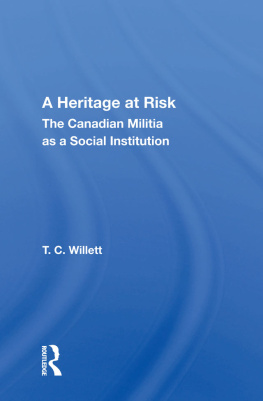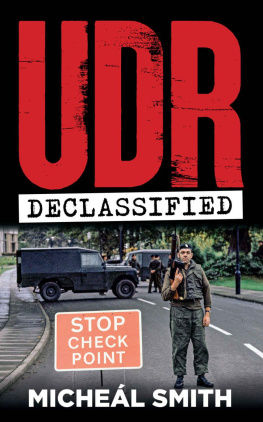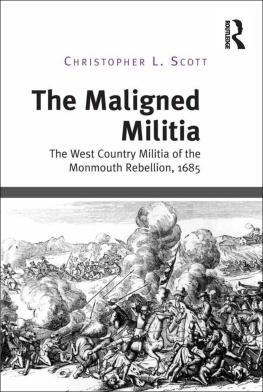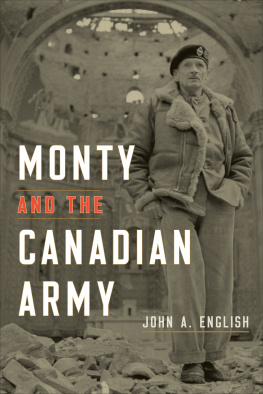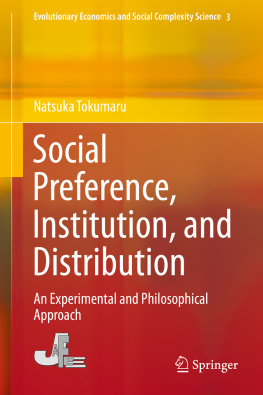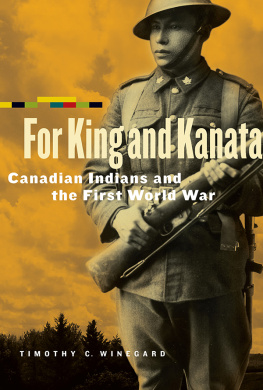A Heritage at Risk
The Canadian Militia as a Social Institution
Series Introduction
The Inter-University Seminar on Armed Forces and Society, founded in 1960 by Morris Janowitz, is an international and multidisciplinary society of independent scholars interested in the military, military institutions, and their relationships with the broader society. Some of the best work in these areas is published in our quarterly journal, Armed Forces and Society. We are a nonpartisan, nonprofit scholarly society; we do not accept government grants or take positions on political issues as an organization. We would like to thank the Ford Foundation for its continued support of our activities.
The IUS is pleased to present T. C. Willett's A Heritage at Risk: The Canadian Militia as a Social Institution as the first volume of our new book series, IUS Special Editions on Armed Forces and Society. We anticipate that Professor Willett's definitive study of a particular institution and its setting will also be useful as a case study for those interested in military/societal interactions generally.
The purpose of this series is to give IUS Fellows and other scholars the opportunity to consider subjects relating to armed forces and society in greater depth than is possible in a journal article. A forthcoming volume will deal with the perceptions of knowledgeable foreign observers of the U.S. military and its capability. We welcome proposals and suggestions for future books in this series.
As general editor, I wish to express my deep appreciation to Terry Willett, who gave the IUS the opportunity to publish this important study. I am extremely grateful to Susan McEachern, our editor at Westview Press, and her assistant, Beth Rosenfeld, who expertly guided us through the complexities of producing the book and made numerous helpful suggestions along the way. I owe a special debt of gratitude to IUS Chairman Sam C. Sarkesian, whose encouragement and assistance have been crucial for my own professional endeavors.
Persons interested in the work of the Inter-University Seminar, wishing to affiliate with the IUS as Fellows, or having suggestions for future volumes in this series are invited to contact the Seminar: IUS Secretariat, The University of Chicago, Social Science Building, Box 46, 1129 East 59th Street, Chicago, Illinois 60637.
John Allen Williams
Executive Director
About the Book and Author
In this comprehensive study of Canada's reserve army, the Militia, Professor Willett focuses on the regiment as both a civic and a military institution that has declined in status and visibility since the country's armed services were unified in 1967. The author uses social history and a sociological framework to explore the major problems that have beset the Militia in its attempts to maintain its strength and efficiency in peacetime.
In this detailed ethnography of the Militia at work and at leisure, the author draws on his extensive fieldwork with headquarter staffs and units throughout Canada. Proposing strategies for reviving the Militia's status, he advocates developing a credible peacetime role to attract the interest and support of local communities without detracting from the Militia's ability to fight alongside the regular Army in war.
T. C. Willett is professor emeritus of sociology, Queen's University, Canada.
A Heritage at Risk
The Canadian Militia as a Social Institution
T. C. Willett
IUS Special Editions on Armed Forces and Society
First publishing 1987 by Wsetview Press
Published 2018 by Routledge
52 Vanderbilt Avenue, New York, NY 10017
2 Park Square, Milton Park, Abingdon, Oxon OX14 4RN
Routledge is an imprint of the Taylor & Francis Group, an informa business
Copyright 1987 by the Inter-University Seminar on Armed Forces and Society
All rights reserved. No part of this book may be reprinted or reproduced or utilised in any form or by any electronic, mechanical, or other means, now known or hereafter invented, including photocopying and recording, or in any information storage or retrieval system, without permission in writing from the publishers.
Notice:
Product or corporate names may be trademarks or registered trademarks, and are used only for identification and explanation without intent to infringe.
is reprinted by permission of Routledge and Kegan Paul.
Library of Congress Cataloging-in-Publication Data
Willett, T. C.
A heritage at risk.
(IUS special editions on armed forces and society)
Bibliography: p.,
Includes index.
1. CanadaMilitia. 2. Sociology, MilitaryCanada.
I. Title. II. Series.
UA600.W55 1987 355.3'7'0971 87-25338
ISBN 0-8133-7430-8
ISBN 13: 978-0-367-01412-4 (hbk)
To Freddie, my wife,
and in memory of my teacher
John Spencer
This book has been unusually difficult to complete. Besides addressing a diverse audience, there was the unexpected problem that the Canadian market for a book on the Militia was too small for publication in Canada to be profitable.
Fortunately, contact with Sam Sarkesian and Jay Williams, of the Inter-University Seminar on Armed Forces and Society (IUS), acknowledged experts in the field, led me to consider and decide upon U.S. publication. Their response to the manuscript was very encouraging. The reviews they arranged were critical but constructive, and they have enabled me to produce a work that is infinitely more worthy of my subjects than the earlier versions.
This book represents a considerable investment in time and confidence by more past and present members of the Canadian Army than I can mention by name. For nearly a decade I have received the confidence and hospitality of the members of the headquarters and regiments with whom I worked, despite the many frustrations that accompany the advantages of being a soldier, whether full time or part time, in Canada today. They spoke frankly and "without strings," with the understanding that I would present a realistic account of an institution they valued and wanted to improve. I have tried to present their views without distortion and to distinguish them clearly from opinions of my own, for which I alone am responsible.
I would like to thank, in particular, two Army officers who helped me greatly in getting my fieldwork started: Lieutenant Colonels Thane Wheeler, now retired from the regular force, and Tom Stafford from the Militia, both gunners like me. I also acknowledge with pleasure the short but instructive visits to the Army National Guard in Michigan arranged by Colonel J. R. Lippert and his colleagues.
I gratefully acknowledge the generous support given to me by the Social Sciences and Humanities Council of Canada and the School of Graduate Studies and Research of Queen's University. When this project was conceived, the sociology of the military was not an active field of scholarship in Canada, and I have no doubt that my sponsors were taking rather a gamble, though none said so.
Fortunately, there is in Canada a small group of scholarsthe Canadian chapter of the IUSon whom I was able to lean for moral support. Of these I would like to mention especially Dr. Charles A. Cotton, formerly a lieutenant colonel in the Canadian regular force, and Dr. Franklin C. Pinch, who is still serving as a senior officer. I acknowledge also the direct and indirect assistance given to me by Alex Douglas and Ben Greenhous of the Directorate of History in the Department of National Defense and by Sam Woodend and Anthony Kellett of the Operational Research Analysis Establishment in the same ministry. However, my work does not carry any kind of imprimatur from them. The interpretations in it are mine except in the instances where I have specified otherwise.

